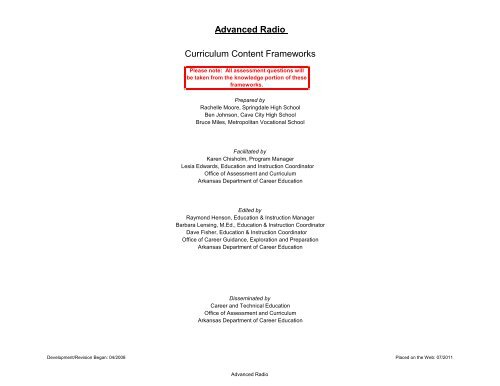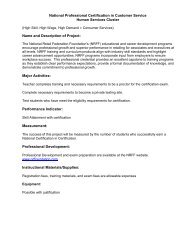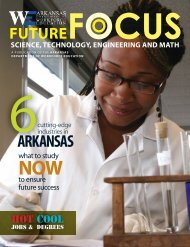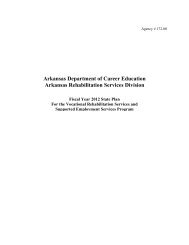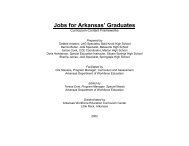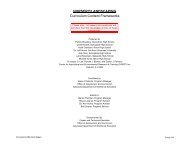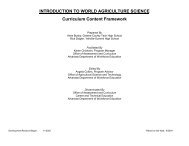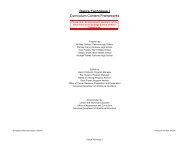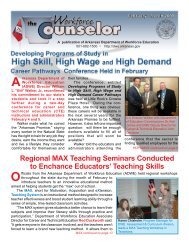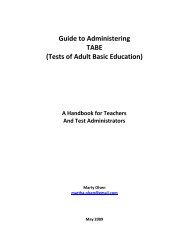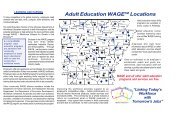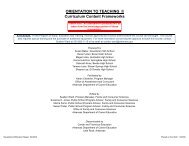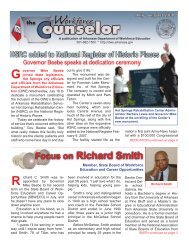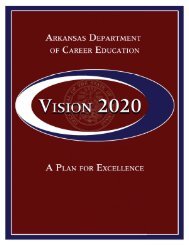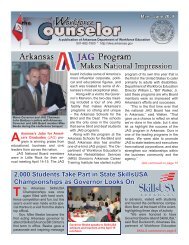Advanced Radio - Arkansas Department of Career Education
Advanced Radio - Arkansas Department of Career Education
Advanced Radio - Arkansas Department of Career Education
You also want an ePaper? Increase the reach of your titles
YUMPU automatically turns print PDFs into web optimized ePapers that Google loves.
<strong>Advanced</strong> <strong>Radio</strong><br />
Curriculum Content Frameworks<br />
Please note: All assessment questions will<br />
be taken from the knowledge portion <strong>of</strong> these<br />
frameworks.<br />
Prepared by<br />
Rachelle Moore, Springdale High School<br />
Ben Johnson, Cave City High School<br />
Bruce Miles, Metropolitan Vocational School<br />
Facilitated by<br />
Karen Chisholm, Program Manager<br />
Lesia Edwards, <strong>Education</strong> and Instruction Coordinator<br />
Office <strong>of</strong> Assessment and Curriculum<br />
<strong>Arkansas</strong> <strong>Department</strong> <strong>of</strong> <strong>Career</strong> <strong>Education</strong><br />
Edited by<br />
Raymond Henson, <strong>Education</strong> & Instruction Manager<br />
Barbara Lensing, M.Ed., <strong>Education</strong> & Instruction Coordinator<br />
Dave Fisher, <strong>Education</strong> & Instruction Coordinator<br />
Office <strong>of</strong> <strong>Career</strong> Guidance, Exploration and Preparation<br />
<strong>Arkansas</strong> <strong>Department</strong> <strong>of</strong> <strong>Career</strong> <strong>Education</strong><br />
Disseminated by<br />
<strong>Career</strong> and Technical <strong>Education</strong><br />
Office <strong>of</strong> Assessment and Curriculum<br />
<strong>Arkansas</strong> <strong>Department</strong> <strong>of</strong> <strong>Career</strong> <strong>Education</strong><br />
Development/Revision Began: 04/2008 Placed on the Web: 07/2011<br />
<strong>Advanced</strong> <strong>Radio</strong>
Curriculum Content Frameworks<br />
<strong>Advanced</strong> <strong>Radio</strong><br />
Grade Levels: 11, 12<br />
Prerequisite: Intermediate <strong>Radio</strong><br />
Course Code: 493400 Lab 493410<br />
Course Description: This independent production based program is designed to provide the advanced radio student the opportunities to master the skills and<br />
knowledge needed to begin a comprehensive career in radio broadcasting.<br />
Table <strong>of</strong> Contents<br />
Page<br />
Unit 1: Management<br />
1<br />
Unit 2: Production<br />
2<br />
Unit 3: Announcing<br />
3<br />
Unit 4: Workplace Skills Development<br />
4<br />
Glossary<br />
5<br />
<strong>Advanced</strong> <strong>Radio</strong>
Unit 1: Management<br />
Hours: 20<br />
Terminology: Account executive, Anchor, Announcer, Business manager, Copywriter, DJ, Engineer, GM, MD, News director, Operator, PD, Production director, Promotion director,<br />
Reporter<br />
CAREER and TECHNICAL SKILLS<br />
What the Student Should be Able to Do<br />
ACADEMIC and WORKPLACE SKILLS<br />
What the Instruction Should Reinforce<br />
Knowledge Application Skill Group Skill Description<br />
1.1 Define terms 1.1.1 Use terminology appropriately in context Foundation Speaking<br />
Uses technical terms as appropriate to audience<br />
[1.5.2]<br />
1.2 Discuss management<br />
1.2.1 Demonstrate manager responsibilities Personal<br />
Responsibility Comprehends ideas and concepts related to<br />
responsibilities<br />
Management<br />
radio station management [3.4.2]<br />
1.2.2<br />
Demonstrate program manager<br />
responsibilities<br />
Interpersonal<br />
Leadership<br />
Delegates responsibility to an individual within<br />
the group or team [2.4.4]<br />
1.2.3<br />
Demonstrate news director responsibilities<br />
Interpersonal<br />
Leadership<br />
Conveys attitudes and values <strong>of</strong> group to others<br />
[2.4.2]<br />
1.2.4<br />
Demonstrate sales manager<br />
responsibilities<br />
Interpersonal<br />
Leadership<br />
Organizes group in planning and performing<br />
radio sales events [2.4.9]<br />
1.2.5 Demonstrate traffic director responsibilities Interpersonal Leadership Directs individuals in the performance <strong>of</strong> a<br />
specific task [2.4.5]<br />
1.3 Discuss managerial hierarchy 1.3.1 Perform managerial duties as a team Interpersonal Teamwork Works effectively with others to reach common<br />
goals [2.6.6]<br />
<strong>Advanced</strong> <strong>Radio</strong><br />
1
Unit 2: Production<br />
Hours: 40<br />
Terminology: Ambient, Bed, Board, Bridge, Cardioid, Condenser, Console, Control room, Cue, Cut, Directional, Dynamic, Element, Gain, Input, Level, Line, Mix, Pot, Production,<br />
Unidirectional, Volume, VU, XLR<br />
CAREER and TECHNICAL SKILLS<br />
What the Student Should be Able to Do<br />
ACADEMIC and WORKPLACE SKILLS<br />
What the Instruction Should Reinforce<br />
Knowledge Application Skill Group Skill Description<br />
2.1 Define terms 2.1.1 Use terminology appropriately in context Foundation Speaking<br />
Uses technical terms as appropriate to audience<br />
[1.5.2]<br />
2.2 Discuss steps to completing a 2.2.1 Demonstrate the proper use <strong>of</strong> field Foundation Science<br />
Uses equipment and techniques according to<br />
production (field, on-air,<br />
equipment<br />
nature <strong>of</strong> event [1.4.23]<br />
commercial, podcast)<br />
2.2.2<br />
Apply field production techniques<br />
Foundation<br />
Science<br />
Chooses appropriately from a variety <strong>of</strong><br />
techniques to complete a task [1.4.8]<br />
2.2.3<br />
Program clocks for radio show<br />
Foundation<br />
Writing<br />
Composes and creates documents, graphs and<br />
flow charts, for day parts [1.6.8]<br />
2.2.4 Complete production projects (on-air Thinking<br />
checks, news and/or play by play, written<br />
and produced commercial, written and<br />
produced PSAs, podcasts <strong>of</strong> news and/or<br />
play by play, liners, beds)<br />
2.2.5 Produce a radio show using a specific Thinking<br />
format (country, hip hop, classic rock, etc.)<br />
and all learned elements (news, written<br />
and produced commercial, written and<br />
produced PSAs, liners)<br />
Problem Solving<br />
Creative Thinking<br />
Comprehends ideas and concepts related to the<br />
radio production process [4.4.1]<br />
Creates a new design by applying specified<br />
criteria [4.1.3]<br />
2.2.6 Perform interview from industry<br />
Thinking<br />
pr<strong>of</strong>essional<br />
Reasoning<br />
Applies rules and principles to a new situation<br />
and audience [4.5.1]<br />
<strong>Advanced</strong> <strong>Radio</strong><br />
2
Unit 3: Announcing<br />
Hours: 40<br />
Terminology: Air check, Articulation, Back time, Combo, Cross-fade, Dead air, Front-sell, Inflection, Phrasing, Slate, Warm-up<br />
CAREER and TECHNICAL SKILLS<br />
What the Student Should be Able to Do<br />
ACADEMIC and WORKPLACE SKILLS<br />
What the Instruction Should Reinforce<br />
Knowledge Application Skill Group Skill Description<br />
3.1 Define terms 3.1.1 Use terminology appropriately in context Foundation Speaking Uses technical terms as appropriate to audience<br />
[1.5.2]<br />
3.2 Discuss proper announcing 3.2.1 Build show prep<br />
Thinking Creative Thinking Prepares presentation based on subject<br />
techniques<br />
research, interviews, news, etc. [4.1.10]<br />
3.2.2<br />
Conduct on-air show<br />
Personal<br />
Management<br />
Responsibility<br />
Maintains a high level <strong>of</strong> concentration in<br />
completion <strong>of</strong> a task [3.4.7]<br />
3.2.3<br />
Conduct on-air interviews<br />
Foundation Listening Comprehends ideas and concepts related to the<br />
effective radio interview [1.2.1]<br />
<strong>Advanced</strong> <strong>Radio</strong><br />
3
Unit 4: Workplace Skills Development<br />
Hours: 20<br />
Terminology: Attitude, Budget, Cover letter, Evaluation, Interpersonal skills, Interview, Job duties, Portfolio, Resume, Teamwork, Timeline, Timeliness<br />
CAREER and TECHNICAL SKILLS<br />
What the Student Should be Able to Do<br />
ACADEMIC and WORKPLACE SKILLS<br />
What the Instruction Should Reinforce<br />
Knowledge Application Skill Group Skill Description<br />
4.1 Define terms<br />
4.1.1 Use terminology appropriately in context Foundation Speaking Uses technical terms as appropriate to audience<br />
[1.5.2]<br />
4.2 Explain the connection between 4.2.1 Evaluate the success <strong>of</strong> a particular project Personal<br />
Analyzes own knowledge, skills and ability [3.1.2]<br />
Management<br />
taking responsibility and<br />
success on the job<br />
<strong>Career</strong> Awareness,<br />
Development, and<br />
Mobility<br />
4.2.2<br />
4.3 Examine the components <strong>of</strong> a 4.3.1<br />
career portfolio<br />
Explain personal and organization Personal<br />
consequences <strong>of</strong> meeting or failing to meet Management<br />
performance requirements<br />
Revise personal resume and cover letter Personal<br />
Management<br />
Responsibility<br />
<strong>Career</strong> Awareness,<br />
Development, and<br />
Mobility<br />
Accepts responsibility for position success or<br />
failure [3.4.1]<br />
Develops skills to locate, evaluate, and interpret<br />
career information [3.1.4]<br />
4.3.2<br />
Collect samples <strong>of</strong> work (on-air check,<br />
news and/or play by play, written and<br />
produced commercials, written and<br />
produced PSAs, podcasts <strong>of</strong> news and/or<br />
play by play, liners, beds)<br />
Foundation Listening Evaluates oral and audio information and<br />
presentations [1.2.2]<br />
4.3.3<br />
4.4 Reinforce interviewing 4.4.1 Demonstrate proper interviewing skills Foundation Speaking<br />
techniques<br />
4.5 Explain the effects <strong>of</strong> career 4.5.1<br />
awareness<br />
Collect references, letters <strong>of</strong><br />
recommendation, and documentation <strong>of</strong><br />
certifications, honors, and awards<br />
Invite public speakers<br />
Personal<br />
Management<br />
Personal<br />
Management<br />
Self-Esteem<br />
<strong>Career</strong> Awareness,<br />
Development, and<br />
Mobility<br />
Presents positive personal references <strong>of</strong><br />
education and work experience [3.5.8]<br />
Uses verbal language and other cues such as<br />
body language appropriate in style , tone, and<br />
level <strong>of</strong> complexity to the audience and the<br />
occasion [1.5.14]<br />
Explores career opportunities [3.1.6]<br />
4.5.2<br />
Take field trips<br />
Personal<br />
Management<br />
Self-Esteem<br />
Develops and initiates a plan for selfimprovement<br />
[3.5.4]<br />
4.5.3 Explore job shadowing opportunities Thinking Decision Making Evaluates information to make best decision<br />
[4.2.5]<br />
<strong>Advanced</strong> <strong>Radio</strong><br />
4
1. Account executive – person who maintains contact with advertising clients<br />
2. Anchor – person who delivers the news<br />
3. Announcer – the person who speaks to the audience<br />
4. Business manager – person responsible for the station's financial matters<br />
5. Copywriter – person who produces written work for production<br />
6. DJ – disk jockey, announcer<br />
7. Engineer – person responsible for equipment operation and maintenance<br />
8. GM – general manager<br />
9. MD – music director<br />
10. News Director – person who directs the news department<br />
11. Operator – person who controls the equipment operation<br />
12. PD – program director<br />
13. Production director – manager <strong>of</strong> the production process<br />
14. Promotion director – manager <strong>of</strong> the promotions department<br />
15. Reporter – person who gathers the news<br />
Glossary<br />
Unit 1: Management<br />
<strong>Advanced</strong> <strong>Radio</strong><br />
5
Unit 2: Production<br />
1. Ambient – background or extraneous sound<br />
2. Bed – background music<br />
3. Board – audio mixing console<br />
4. Bridge – sound between program segments<br />
5. Cardioid – heart shaped pick up pattern, rejects sound from the rear<br />
6. Condenser – microphone with capacitative electrical element<br />
7. Console – a device to mix sources<br />
8. Control room – area where the program is adjusted or controlled<br />
9. Cue – a signal to begin the next segment<br />
10. Cut – a segment <strong>of</strong> recorded sound<br />
11. Directional – to pick up sound from only one direction<br />
12. Dynamic – coil moving through a magnetic field in response to sound vibration<br />
13. Element – microphone part that transduces sound into electrical energy<br />
14. Gain – volume or amplification<br />
15. Input – terminal receiving incoming signal<br />
16. Level – audio measurement<br />
17. Line – connection used for audio transmission<br />
18. Mix – to combine sources<br />
<strong>Advanced</strong> <strong>Radio</strong><br />
6
Unit 2: Production<br />
19. Pot – potentiometer, a device to control volume<br />
20. Production – to combine sounds into a finished product<br />
21. Unidirectional – to pick up sound from one direction only<br />
22. Volume – audio level<br />
23. VU – volume unit<br />
24. XLR – three pin audio connector<br />
<strong>Advanced</strong> <strong>Radio</strong><br />
7
Unit 3: Announcing<br />
1. Air check – on–air recording <strong>of</strong> a performer<br />
2. Articulation – clarity <strong>of</strong> speaking sound<br />
3. Back time – timing to end at a certain point<br />
4. Combo – to combine announcing and engineering duties at a console<br />
5. Cross–fade – gradual replacement <strong>of</strong> one sound with another<br />
6. Dead air – unplanned silence during a program<br />
7. Front–sell – announce event or selection before it is played<br />
8. Inflection – announcer's use <strong>of</strong> tone and pitch<br />
9. Phrasing – announcer's use <strong>of</strong> timing and pace<br />
10. Slate – to mark the beginning <strong>of</strong> a taped segment<br />
11. Warm–up – preparation <strong>of</strong> the voice before going on the air<br />
<strong>Advanced</strong> <strong>Radio</strong><br />
8
Unit 4: Workplace Skills Development<br />
1. Attitude – over–all outlook and state <strong>of</strong> mind<br />
2. Budget – an itemized list <strong>of</strong> expected income and expense for a given time<br />
3. Cover letter – a personalized page that serves as an introduction to a resume, application, or proposal<br />
4. Evaluation – an examination or judgment <strong>of</strong> an employee's work efficiency<br />
5. Interpersonal skills – a person's ability to operate within business organizations through social communications and interactions<br />
6. Interview – to effectively present oneself and convey employment qualifications<br />
7. Job duties – a detailed description <strong>of</strong> responsibilities for a specific position <strong>of</strong> employment<br />
8. Portfolio – a document containing assessments, work samples, education, skills, goals, and plans used for education or job application<br />
9. Resume – a formal document that sums up a person's pr<strong>of</strong>essional and educational experience<br />
10. Teamwork – to work with others, share ideas, and to help each other<br />
11. Timeline – a schedule <strong>of</strong> short and long term goals<br />
12. Timeliness – to be prompt and to manage time effectively<br />
<strong>Advanced</strong> <strong>Radio</strong><br />
9


